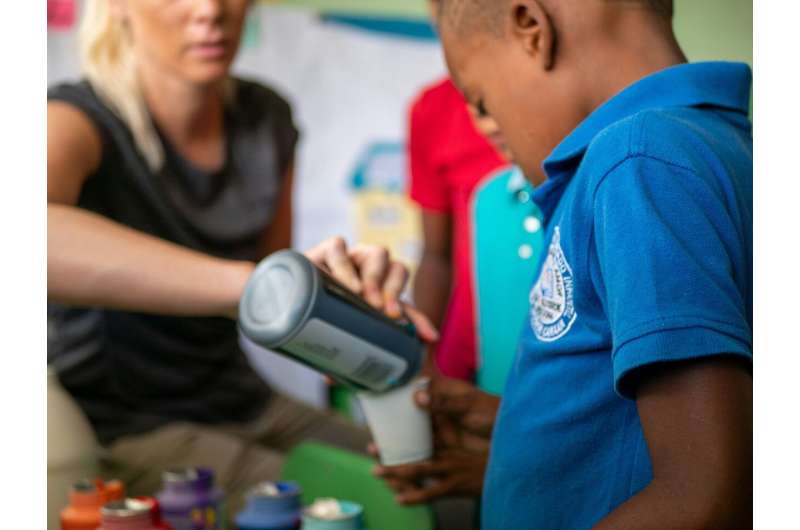This article has been reviewed according to Science X's editorial process and policies. Editors have highlighted the following attributes while ensuring the content's credibility:
fact-checked
trusted source
proofread
Experts address the global health threat of Chagas disease

Chagas disease, once thought to be confined to South and Central America, is now an emerging public health threat in the United States, making it more important than ever for local physicians to understand the history of the disease and how to recognize it when caring for patients.
In a historical review of Chagas, Mario Grijalva, Ph.D., director of the Ohio University Heritage College of Osteopathic Medicine's Infectious and Tropical Disease Institute, and a team of international experts shed light on current challenges and future directions for global health efforts in the fight against Chagas.
The review, titled "Chagas Disease across the Ages: A Historical View and Commentary on Navigating Future Challenges," is published in the journal Microorganisms.
Their work not only advances scientific knowledge but provides insights into potential improvements to patient care and how the international public health community can address the often neglected disease, ultimately contributing to efforts to eradicate it.
"Chagas disease is not just a problem for Latin America," Grijalva said. "With global travel and migration, the disease has spread to non-endemic regions, including the U.S. People in Ohio and across the country need to be aware of this disease to improve diagnosis and treatment."
Chagas disease is a life-threatening illness primarily transmitted by insects known as "kissing bugs." The disease affects approximately 8 million people worldwide, according to the Centers for Disease Control and Prevention. It is a potentially life-threatening parasitic infection that can be acute or chronic, and, if left untreated, lead to severe heart or digestive health complications.
Today, it is estimated that over 288,000 people are living with Chagas in the U.S. Both the parasite–Trypanosoma cruzi–and the insects that transmit it are now present in southern portions of the country, presenting an increased risk for transmission beyond endemic regions, primarily located in rural parts of Latin America.
In the recently published historical review, Grijalva explains that advancements in diagnosing have evolved, with current techniques such as rapid diagnostic tests making detection more accessible. However, the chronic phase of the disease remains challenging to treat, with current drugs presenting limitations and severe side effects.
Additionally, social and political barriers still exist, due in part to the primarily marginalized population Chagas affects–those living in rural regions of South and Central America with high poverty rates and limited access to health care—which limit the uptake of treatment and diagnostic resources.
In the U.S. specifically, limited awareness by health care providers and the general public is the biggest barrier to addressing Chagas, according to a 2019 review of the disease. The work of Grijalva and his collaborators is critical for ensuring the disease remains at the forefront of conversations surrounding global public health.
"What this really highlights is the importance of taking a multidisciplinary approach to tackling Chagas disease," Grijalva said.
"Enhanced diagnostics, improved treatment accessibility, sustained control efforts, and global collaboration are all crucial if we want to work toward reducing the disease's impact and, hopefully, see its eventual eradication."
Based on more than two decades of focused research and fieldwork, Grijalva is an internationally recognized expert on the spread of infectious diseases and is perhaps one of the world's premier experts on Chagas disease.
Chagas has been prevalent for decades in his native country of Ecuador, where he pursues an ongoing campaign to prevent the spread of the potentially lethal disease with support from agencies including the World Health Organization, the National Institutes of Health, the Pan American Health Organization and the European Union's Chagas Disease Epidemiological Network.
In June 2016, Grijalva visited Ecuador with a delegation from Ohio University for the opening of the Pontifical Catholic University of Ecuador's Center for Research in Health in Latin America, which he directed until 2023 when Ohio University graduate Jaime Costales, Ph.D., took over the position.
The center is one of the most advanced research facilities in Latin America, providing opportunities and resources for faculty and students from both universities to collaborate in studying the prevention, detection, diagnosis and treatment of Chagas and other diseases.
In addition to Grijalva, the review was conducted in collaboration with two researchers from the Institute of Research for Development (IRD) in Montpellier, France, lead author Denis Sereno, Ph.D., and co-author Bruno Oury, Ph.D.
Those interested in learning more about Chagas, can also watch the video series "Jaguarundi Moto Adventure," which seeks to raise awareness about Chagas. In each episode, Grijalva travels by motorcycle across Ecuador and other regions, visiting communities affected by the disease and talking about the spread of Chagas and preventative measures that can be taken.
More information: Denis Sereno et al, Chagas Disease across the Ages: A Historical View and Commentary on Navigating Future Challenges, Microorganisms (2024). DOI: 10.3390/microorganisms12061153



















